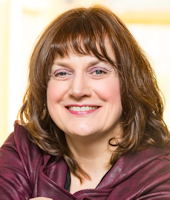What It Was Like
Maureen F. Bowe
June 2020
Numerous times over the past three months, people who know I’m a nurse have asked, ‘What’s it like?” I immediately know what they mean: What’s it like being on the front line of the COVID pandemic? Normally, I tell them it’s been fine. Some days I ramble on. Most often, I simply say, “It’s been tough.” If I say more, I’m afraid the floodgates will open about what this pandemic has really been like for nurses like me.
I remember April 17, 2020 all too clearly. That was the day my colleague, Gabby, a registered nurse, left the hospital after recovering from COVID-19. Finally, after eight weeks of this pandemic, I had something to look forward to. First, I heard the clapping. Then came the sound of the staff singing, “Rise Up.” Finally, I saw Gabby herself. Lesley pushed her wheelchair.
Gabby was surrounded by her coworkers. I started to cry. She passed me. I looked into her eyes. I was grateful then, as now, that she never required a ventilator but she’d come so close! I’d been so frightened that day to think one of our own would need this lifesaving equipment.
I looked out the lobby window. There was Gabby’s mother, standing by their maroon car. My heart beat faster. What if that was me waiting for Kelly, my beloved daughter? Would I be able to stand there so patiently? Gabby was finally out the door and by her mother’s side. They embraced. Gabby slowly got into her car.
It was my turn then to sit down in the hospital lobby and say a prayer. Thankfully, Gabby was one of the lucky ones who survived COVID-19. Not all will be so fortunate. This pandemic has been terrifying.
And here’s what it really was like to live through the many scenarios of this crisis.
It was unfathomable to see a nurse holding an iPad to the face of a dying patient so their family could witness their loved one’s death.
It was frightening to witness my friend, the infection control practitioner, working seven days a week and hope she had the stamina to continue.
It was unnatural to wear a mask from the moment I stepped into the hospital to the moment I left.
It was unnerving to see grandparents cry because they missed the birth of their first grandchild.
It was inspiring to observe nurses caring for their patients, their families, and their fellow nurses, exhausted after working sixteen hours straight.
It was heart-wrenching to deny a family’s request to visit a critically ill patient.
It was challenging to be responsible for scheduling the correct number of healthcare workers to safely take care of our patients, knowing there was less staff than needed and realizing my colleagues were at risk for contracting COVID.
It was unimaginable to create a ventilator surge plan while wondering if I’d be the one responsible for making a life-and-death choice on who would use this emergency equipment.
It was uplifting to see my staff protect their colleagues who were pregnant or immunocompromised by reducing their risk of COVID exposure.
It was scary to be called in the middle of the night by a friend whose three-year-old child may need to be admitted because of respiratory problems.
It was rewarding to witness staff helping each other and safely donning personal protective equipment.
It was horrifying to develop a triage process for hospitalized beds, knowing some patients wouldn’t get one.
It was terrifying, gratifying but, most of all, awe-inspiring. I have never been more proud to say, “I am a nurse.”
At the height of the COVID pandemic, nurses were at bedsides, as we have always been, caring for our patients, holding their hand, granting final requests, listening to their regrets, providing comfort, and making sure no one died alone. We know it’s our legacy of caring and compassion that will inspire the next generation of men and women to want to say, “I am a nurse.”
Maureen F. Bowe, MSN, RN, always wanted to follow in her mother’s footsteps and become a nurse. Her dream was realized when she graduated from Thomas Jefferson University School of Nursing in 1974. She has never taken lightly her responsibility to care for others when they are the most vulnerable. She has always believed that being a nurse is an honor.
